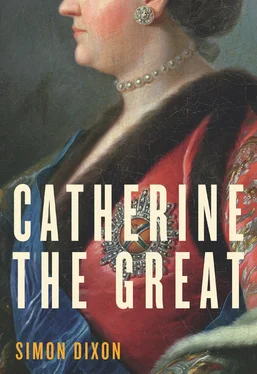Few monarchs would have listened to such subversive talk. Yet the empress remained unperturbed as Diderot went on to inform her, in the space of that same essay, that resistance was ‘a natural right, inalienable and sacred’; that the sovereign was made for the nation and not the other way round; and that any impartial judge of the conflict between the English monarchs and their parliaments would conclude that the king was ‘almost always wrong’ because he attacked popular liberties. 49‘I am allowed to say everything that comes into my head,’ the astonished philosophe explained to Dashkova, ‘wise things, perhaps, when I’m feeling stupid, and perhaps very silly things when I’m feeling wise. Ideas transplanted from Paris to Petersburg certainly take on a very different colour.’ 50The most remarkable thing was that Catherine should be prepared to condescend so graciously to a mere writer. ‘I swear to you that the empress, this astonishing woman, does all in her power to come down to my level,’ Diderot wrote to his wife, ‘but it is at moments like these that I find her ten feet tall.’ 51
Catherine was quite right to tell a later French ambassador that if she had placed her faith in Diderot, ‘every institution in my empire would have been overturned’. 52Nevertheless, she was prepared to offer guarded responses to a questionnaire he gave her in search of information on the Russian economy. Since he frankly admitted that the French government hoped to profit from their acquaintance—‘I should be transported by joy to see my nation united with Russia’—it is hardly surprising that sensitive information was held back from the representative of a hostile power. 53Some of his questions were deflected to officials; others were answered more frankly, particularly when they offered Catherine the opportunity to boast about the rich variety of her empire’s wildlife; still more received a curt ‘I don’t know’. The most delicate inquiries were brushed aside with a playfulness she knew he would appreciate:
Q. In which provinces are your woollen manufactories?
A. In every province where there are sheep.
Q. What is the public debt?
A. So modest that I could pay it off in twenty-four hours if I wanted to. 54
Diderot, it is now clear, took his visit to St Petersburg more seriously than once was thought. Conceiving of Russia as a tabula rasa on which an appropriately enlightened mind could create a new and glorious civilisation, he saw foreign settlement as a natural way to approach his goal. Though Catherine’s colonies on the Volga had been much discussed in the French salons in the 1760s, they had not passed without criticism. Diderot famously proposed that she should ‘plant’ the seeds of liberty in the form of a colony of Swiss people in Saratov. 55While scholars have been able to demonstrate the connection between this idea and his broader social and political thought, the empress, who had nothing more than the evidence of their conversations to go on, could be forgiven for dismissing such sallies as utopian. As she became irritated by his impracticality, Diderot was conscious of the danger: ‘Nothing is easier than bringing an empire to order with one’s head on one’s pillow. That way, everything goes as one might wish.’ 56What he could not know, because Catherine did not tell him, was that his visit to Russia had coincided with the emergence of the gravest threat to the order of her empire that she ever faced.
* * *
Even as Grimm arrived in St Petersburg on 17 September 1773, an illiterate Don Cossack was issuing his first manifesto to the Yaik Cossack host almost a thousand miles to the south-east: ‘As your fathers and grandfathers served previous tsars to the last drop of their blood, so you, my friends, will serve me, the Great Sovereign Emperor Peter Fedaravich.’ 57When the thirty-one-year-old Yemelyan Pugachëv set out to tempt all those who had ‘longed for him’ with the prospect of land, water, grasses, money, powder and bread, threatening them with his ‘just wrath’ if they refused to answer his call, the prospects for a rebellion in the territory between the Volga and the Urals could hardly have been more promising. 58No matter that portraits of Pugachëv made him look more like a lop-sided Peter the Great than Peter III. He had shown off the scrofulous scars on his chest as the authentic ‘marks of tsardom’ and the forts standing guard over those unruly borderlands were insufficiently manned to repel the heterogeneous band of Cossacks, Old Believers, fugitive serfs, Bashkir and Kazakh tribal leaders (eighteenth-century Russians called them Kirghizians to distinguish them from the Cossacks, kazaki ) who responded to his appeal to defend their traditional freedoms against the advance of Catherine’s Enlightened administration. Not that her bureaucracy presented an indomitable force: Kazan province had only eighty permanent officials for a population of 2.5 million. Famine, plague and war had everywhere taken their toll (the latest levy of one recruit in every hundred souls, decreed on 23 August, was due to begin on 1 October, and by the time it was complete some 323,360 men had been drafted in the space of five years). Once the factory peasants in the metallurgical plants in the Urals had joined him, Pugachëv had the additional advantage of a reliable supply of arms. 59
By the time General Kar was dispatched to quell the rebellion on 15 October, Catherine already knew of Pugachëv’s seizure of Iletsk. A week later, she demanded to see the latest maps of Orenburg province, comprising most of Bashkiria, in order to follow the progress of events. At first she assumed that it was merely a matter of time before Kar sent news of his victory, but this was to underestimate the power of the insurgents. In an area where the Cossacks were in effect the imperial police force, their secession signalled a serious threat to security. Having laid siege to Orenburg on 5 October, Pugachëv set up his own ‘College of War’ at nearby Berda, where his henchman Zarubin Chika called himself Field Marshal Count Chernyshëv and others among his lieutenants adopted the names of Panin and Orlov. Kar’s poorly trained punitive battalion (all that could be spared when the crack troops were in Moldavia and Wallachia) was crushed in early November by a better-disciplined Cossack force more adroit than his own in the use of artillery. News of the disaster reached Tsarskoye Selo on the evening of Catherine’s name day, throwing the Court into alarm. The rebels, she was horrified to learn, now numbered several thousand. Suspecting a Turkish conspiracy, she appointed General Bibikov, the former Marshal of the Legislative Commission, to replace the disgraced Kar, whose arrival in Moscow set off a wave of rumours that forced the government to lift its veil of secrecy over the whole affair. ‘Probably it will all end on the gallows,’ Catherine wrote to Yakov Sievers on 10 December, as Bibikov departed for Kazan, ‘but what sort of expectation is that for me, Mr. Governor, who has no love for the gallows? European opinion will relegate us to the time of Tsar Ivan the Terrible!’ 60
Now she had less time for Diderot, who recorded 5 December as the date of their last discussion. Nor was Vasilchikov the man for a crisis. Instead, on 4 December, the empress wrote her first surviving letter to the man who was to supplant him and almost everyone else in her affections for the remainder of his life. The thirty-four-year-old Grigory Potëmkin was at that time besieging the Turks on the Danube:
Mr Lieutenant-General and Cavalier. You, I imagine, are so firmly focused on Silistria that you have no time to read letters. And although I do not at this moment know whether your bombardment has succeeded, I am certain, nevertheless, that everything you undertake should be ascribed to nothing but your impassioned zeal toward me personally and toward the dear fatherland in general, whose service you love.
Читать дальше












